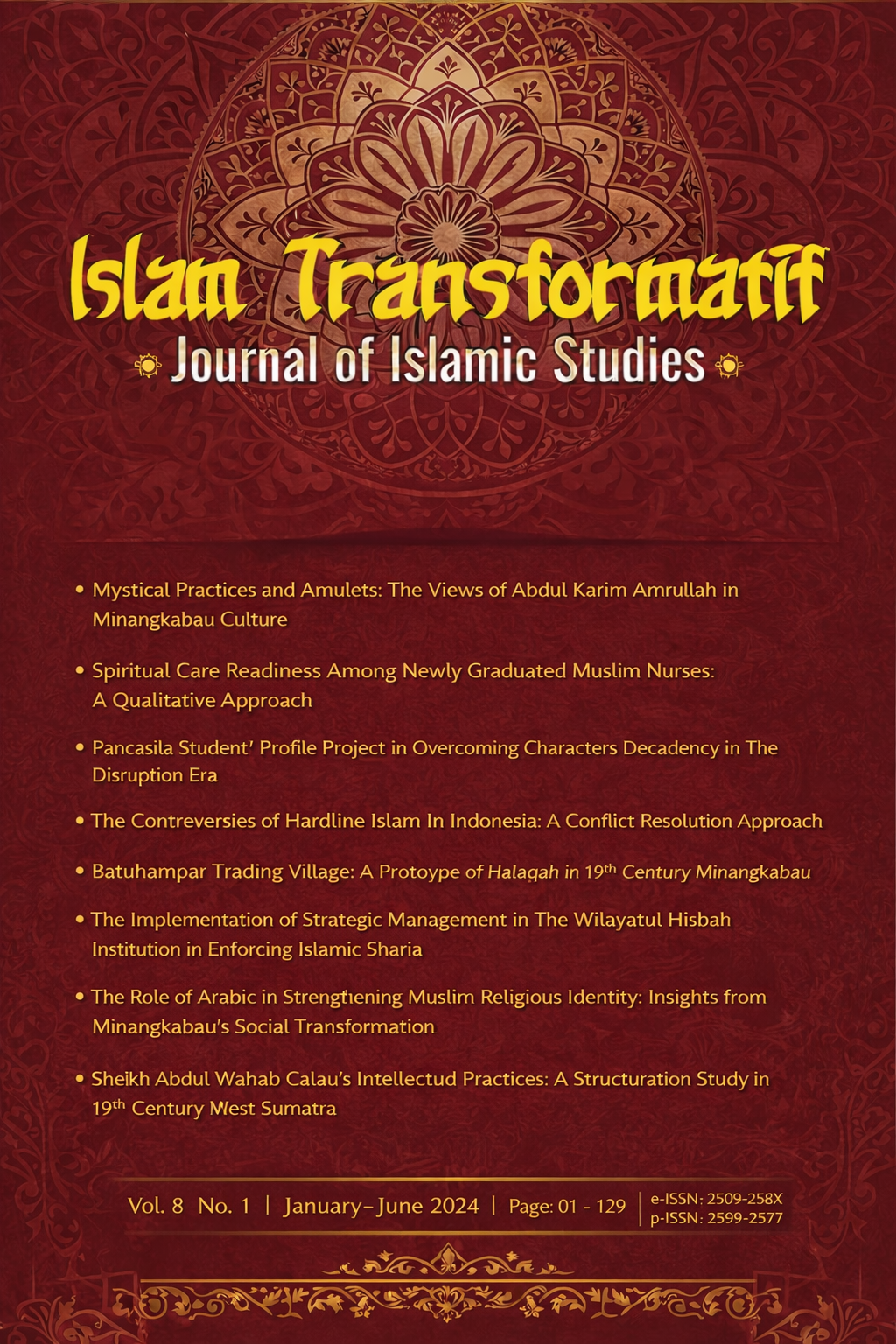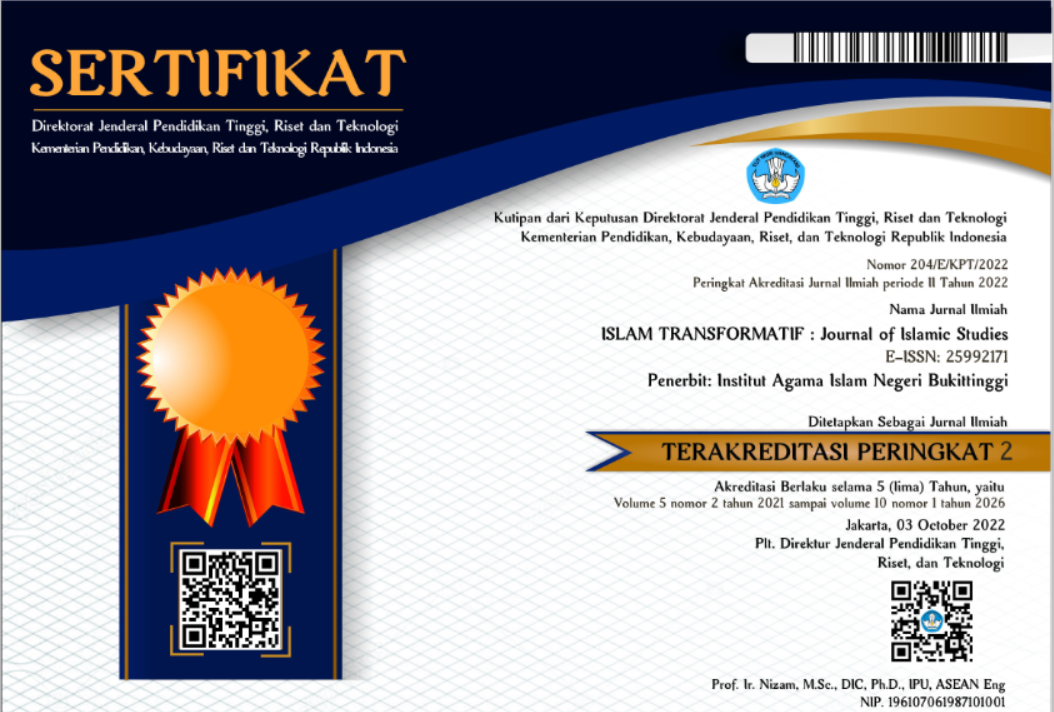The Controversies of Hardline Islam In Indonesia: A Conflict Resolution Approach
DOI:
https://doi.org/10.30983/it.v8i1.8333Keywords:
Hardliner, Resolution Conflict, Islam, TreasonAbstract
The existence of hardline Islam in Indonesia has changed the shocking Islamic culture without violence and has presented an attitude of extreme and radical actions. This research is studied through a qualitative approach with library research. The purpose of this research is to suggest Indonesian hardliner Islam and the government respond to every hardliner maneuver not equated with handling terrorists with a pattern of shot to kill. Therefore, the problem-solving of Indonesian hardliner Islam is resolved by Galtung-style conflict resolution with a “positive peace” step. The results of the research reveal that Indonesian hardline Islam cannot be equated with hardline Islamic movements in other Muslim countries that are similar to the Taliban style or terrorist movements. Most Indonesian hardline Islam is treason, extortion, and undermining against Pancasila by imposing the value of sharia as an effort in “shariatization” so that their movements contradict the highest state regulations that they fall into actions in the criminal category.
Keberadaan Islam garis keras di Indonesia telah mengubah budaya Islam yang mengejutkan tanpa kekerasan menjadi sikap yang ekstrim dan radikal. Penelitian ini dikaji melalui pendekatan kualitatif dengan jenis penelitian kepustakaan. Tujuan dari penelitian ini adalah untuk memberikan saran kepada Islam garis keras Indonesia dan pemerintah untuk menyikapi setiap manuver kelompok garis keras tidak disamakan dengan penanganan teroris dengan pola diintai kemudian tembak mati. Oleh karena itu, penyelesaian masalah Islam garis keras Indonesia diselesaikan dengan resolusi konflik ala Galtung dengan langkah “perdamaian positif”. Hasil penelitian mengungkapkan bahwa Islam garis keras Indonesia tidak bisa disamakan dengan gerakan Islam garis keras di negara-negara Muslim lainnya yang mirip dengan gaya Taliban atau gerakan teroris. Sebagian besar Islam garis keras Indonesia bersifat makar dan merusak pemahaman terhadap Pancasila dengan memaksakan nilai syariatisasi sehingga gerakan mereka bertentangan dengan peraturan tertinggi negara sehingga masuk ke dalam tindakan yang dapat diklasifikasikan dalam kategori kriminal.
References
Akbarzadeh, Shahram. Routledge Handbook of Political Islam. New York: Routledge, 2021.
Al-Khanif. Religious Minorities, Islam and The Law: International Human Rights and Islamic Law in Indonesia. New York: Routledge, 2020.
Avruch, Kevin. Culture & Conflict Resolution. Washington: United State Institute of Peace Press, 2004.
Azra, Azyumardi. Indonesia, Islam, and Democracy: Dynamics in a Global Context. Jakarta: Solstice Publishing, 2006.
———. Jejak-Jejak Jaringan Kaum Muslim. Jakarta Selatan: Hikmah, 2007.
Bakrie, Connie Rahakundidi. Pertahanan Negara Dan Postur TNI Ideal. Jakarta: Yayasan Obor Indonesia, 2007.
Bunker, Robert J., ed. Blood Sucrifices Violent No-State Actors and Dark Magico-Religious Activities. Bloomington: iUniverse, 2016.
Cole, Juan, ed. Peace Movement in Islam: History, Religion and Politics. UK: Bloomsbury Publishing, 2022.
Day, Katie and Edwards, Elise M., ed. The Routledge Handbook of Religion and Cities. New York: Routledge, 2021.
Denny J.A. Membangun Demokrasi Sehari-Hari. Yogyakarta: LkiS, 2006.
Dulkiah, Moh., Paelani Setia, and Muhammad Ikhlas Rosele. “Religious Movements and the Adoption of New Media: The Internet Used by Hizbut Tahrir Indonesia After Disbanded.” Religious: Jurnal Studi Agama-Agama Dan Lintas Budaya 7, no. 1 (April 2023): 21. https://doi.org/10.15575/rjsalb.v7i1.21409.
Ecip, Sutiono Sinansari. Rusuh Poso Rujuk Malino. Jakarta: Cahaya Timur, 2002.
Effendy, Bahtiar. Islam Dan Negara: Transformasi Gagasan Dan Praktik Islam Di Indonesia. Jakarta: Demokrasi Project, 2011.
Fauzi, Ahmad Irfan, and Meidi Kosandi. “Kepentingan Ideologis Negara Dan Nahdlatul Ulama Dalam Pembubaran Hizbut Tahrir Indonesia.” Jurnal Inovasi Ilmu Sosial Dan Politik (JISoP) 4, no. 1 (June 2022): 97–101. https://doi.org/10.33474/jisop.v4i1.15896.
Francis, Taylor Dan. “Commonwealth Law Bulletin, Vol. 30,” 2004.
Freud, Sigmund. The Collected Works of Sigmund Freud. USA: The Library of Alexandria, t.t), 36: The Library of Alexandr, n.d.
Galtung, Johan and Fischer, Dietrich. Johan Galtung: Pioneer of Peace Research. Heiderberg: Springer, 2013.
Galtung, Johan. Peace by Peaceful Means: Peace and Conflict, Development and Civilization. London: Sage Publication, 1996.
Habibullah, Muhammad. “Extremism Counter-Narration of the Jamaah Ansharut Daulah within the Perspective of Ludwig Wittgenstein Language Games Theory.” International Journal of Islamicate Social Studies 1, no. 1 (2023): 47.
———. “Extremism Counter-Narration of the Jamaah Ansharut Daulah within the Perspective of Ludwig Wittgenstein Language Games Theory.” INTERNATIONAL JOURNAL OF ISLAMICATE SOCIAL STUDIES 1, no. 1 (2023): 49.
Hadi, Syamsul et. al. Disintegrasi Pasca Orde Baru, Negara, Konflik Lokal Dan Dinamika Internasional. Jakarta: Cires, 2007.
Hamid, Mas’an. “The Emergence of Hard-Line Islamic Idiology: Impact of Differences Understanding Discourse on the Qur’an.” IOSR Journal of Humanities and Social Science 22, no. 05 (May 2017): 93–99. https://doi.org/10.9790/0837-2205049399.
Hardiansyah, Ari Ganjar Hardiansah et. al. “The Defence Islam Action: A Challenge of Islamic Movement to Democratic Transition in The Post 2014 Indonesia.” Wacana: Indonesian Journal of Social and Humanity Study 20, no. 2 (2017): 61–63.
Hasrullah. Dendam Konflik Poso. Jakarta: Gramedia Pustaka Utama, 2013.
Hendry, Eka Ar. “Pola Gerakan Islam Garis Keras Di Indonesia.” Khatulistiwa 3, no. 2 (2013): 164.
Ibrahim Al-Bajury. Hasyiyah Al-Bajury ’Ala Syarah Ibnu Qasim, Tahqiq. ’Abdu Al-Aziz Al-Khathib Al-Husny, Juz. II. Beirut: Dar Al-Kutub Al-Alamiyah, n.d.
International Crisis Group. “Indonesia: The Dark Side of Jama’ah Ansharut Tauhid (JAT).” Crisis Group Asia Briefing, 2010.
Jefrey, Sana. “Indonesia in 2021: In The Eye of The Storm.” ISEAS–Yusof Ishak Institute 2022, no. 1 (2022): 146.
Jung, Carl Gustav. The Collected Works of C. G. Jung: The Practice of Psychotherapy. London: Routledge & Kegan Paul, 1954.
Karsono, Bambang. Jejak Aktifis JAT: Studi Kasus JAT Dan Jaringan Aceh-Pamulang. Jakarta: Ubhara Jaya Press, 2018.
Kassim, Yang Razali, ed. Jokowi Second Term: Emerging Issues. Singapore: World Scientific Publishing, 2022.
Kperogi, Farooq A. Digital Dissidence and Social Media Cenchorship in Africa. New York: Routledge, 2023.
Kriesberg, Louis. Constructive Conflict: From Escalation to Resolution. Maryland: Rowman & Littlefield Publisher, 2007.
Kumar, Narender. Rise of Islamic Terror in Bangladesh and Impact on North-East India. India: Spring, 2017.
Kurniawan, Anwar, and Ahmad Aminuddin. “Muhammad Thalib, Majelis Mujahidin Indonesia, Dan Tafsir Ayat-Ayat Penegakan Syariat Islam Di Indonesia.” TEOSOFI: Jurnal Tasawuf Dan Pemikiran Islam 8, no. 1 (June 2018): 130. https://doi.org/10.15642/teosofi.2018.8.1.82-112.
Limaye, Satu P., Malik, Mohan dan Wirshing, Robert G. Religious Radicalism and Security in South Asia. Hawai: Asia-Pacific Center for Security Studie, 2004.
Liputan6.com. Mengenang Cecep Bustomi, Front hizbullah Keliling Jakarta (n.d.).
Ma‘arif, Ahmad Stafe‘i. “Garis Keras Memperparah Keadaan.” Tabloid Reformata , Edisi 110, 2009.
Machmudi, Yon. Timur Tengah Dalam Sorotan; Dinamika Timur Tengah Dalam Perspektif Indonesia. Jakarta Timur: Bumi Aksara, 2020.
Mandaville, Peter. Islam and Politics. New York: Routledge, 2020.
McRae, Dave & Haripin, Muhammad. Poso, Sejarah Komprehensif Kekerasan Antar Agama Terpanjang Di Indonesia Pasca Reformasi. Tangerang Selatan: Marjin Kiri, 2016.
Mujani, Saiful, R.William Liddle, and Deni Irvani. “Islamism and Muslim Support for Islamist Movement Organizations: Evidence from Indonesia.” Studia Islamika 30, no. 1 (April 2023): 49–55. https://doi.org/10.36712/sdi.v30i1.33369.
Munawar-Rahman, Budhy. Sekularisme, Liberalisme Dan Pluralisme. Jakarta: Grasindo, n.d.
———. Sekularisme, Liberalisme Dan Pluralisme. Jakarta: Grasindo, 2010.
Nisa, Pia Khoirotun, Tutur Ahsanil Mustofa, Azkia Muharom Albantani, and Mohamad Syafri. “Ex-Terrorist Motivation in Reeducation Program: Case Study of Terrorism Convicts in Indonesia.” TARBIYA: Journal of Education in Muslim Society 10, no. 1 (June 2023): 70. https://doi.org/10.15408/tjems.v10i1.35047.
Paoli, Latizia et.al, ed. Nexus Between Organized Crime and Terrorism: Types Responses. UK: Edward Elgar Publishing, 2022.
Philpott, Daniel. Just And Unjust Peace: Abn Ethics Of Political Reconciliation. New York: Oxford University Press, 2012.
Priyanto, Sapto, Mohammad Kemal Dermawan, and Arthur Josias Simon Runturambi. “ISLAH AS THE KEY SUCCESS OF TERRORIST DISENGAGEMENT PROCESS IN INDONESIA.” Journal of Al-Tamaddun 15, no. 1 (June 2020): 159–62. https://doi.org/10.22452/JAT.vol15no1.11.
Putu Widhi Iswari et.al. “Proceeding of The Ist International Seminar on Sharia, Law, and Moral Society (ISSLAMS 2022),” 292. France: The Atlantis Press, 2022.
Rahayu, Yalizar. Patriotisme Dalam Konsep Islam. Jakarta: Guepedia, 2021.
Ramsbotham, Oliver et. al. Comtemporary Conflict Resolution: The Prevention, Angagement and Transformation of Deadly Conflict. Cambridg: Polity Press, 2011.
Reychler, Luc and Peffenholz, Thania, ed. Peacebuilding: A Field Guide. Colorado: Lynne Ryenner Publishers, 2001.
Rohayana, A. D. ., Sofi, M. J., & Irfandi. “Ibn Ashur’s Concept of Maqasid Sharia-Finding Method.” Jurnal Penelitian 17, no. 1 (2024): 75.
Rozi, Syafuan. Anatomi Dan Resolusi Konflik Di Indonesia: Kekerasan Komunal. Jakarta: P2P-LIP, 2006.
Said Aqil Siradj. “Radikal Ada Tiga,” n.d.
Sandole, Dennis J. D. Peacebuilding. UK: Polity Press, 2010.
Saritoprak. “Badiuzzaman Said Nursi’s Paradigm of Islam Nonviolence.” In Crescent and Dove: Peace and Conflict Resolution in Islam, edited by Qamar Ul-Huda, 103, 2010.
Shcirch, Lisa, ed. The Ecology of Violent Extremism; Perspective on Peacebuilding and Human Security. Maryland: Rowman & Littlefield, 2018.
Syahlan, Taslim. “Menangkal Gerakan Radikalisme Islam Melalui Sekolah.” Magistra 6, no. 2 (2015): 2.
Thaher, Elza Peldi. Merayakan Kebebasan Beragama: Bunga Rampai Menyambut 70 Tahun Djohan Effendi. Jakarta: ICRP, 2009.
Vanderberg, Andrew and Suryani, Nazrina, ed. Security, Democracy and Society in Bali: Trouble with Protection. Singapore: Springer, 2021.
Wahab, Abdul Jamil. Manajemen Konflik Keagamaan (Analisa Latar Belakang Konflik). Jakarta: Elex Media Komputindo, 2014.
Wahid, Abdurrahman. Ilusi Negara Islam,: Ekspansi Gerakan Islam Transnasional Di Indonesia. Jakarta: Wahid Institute, 2009.
Walker, Andrew. What Is Boko Haram? Washington: The United State Institute of Peace, 2012.
Widayat, Ilovia Ayaregita, Diana Mutiara Bahari, Azka Azzahra Salsabila, Nabila Rizky Sri Handayani, and Hanna Khairunnisa Adjie. “Konflik Poso : Sejarah Dan Upaya Penyelesaiannya.” Jupiis: Jurnal Pendidikan Ilmu-Ilmu Sosial 13, no. 1 (June 2021): 1. https://doi.org/10.24114/jupiis.v13i1.18618.
Wijaya, Nanang. “Resolusi Konflik Berbasisi Budaya Oleh Masyarakat Kabupaten Poso.” Jurnal Kolaborasi Resolusi Konflik 2, no. 1 (April 2020): 58. https://doi.org/10.24198/jkrk.v2i1.27048.
Yilmaz, Ihsan and Morieson, Nicholas. Religion and The Global Rise Civilizational Populism. Singapore: Springer, 2023.
Yosafzai, Malala and McComick, Patricia. I Am Malala: How One Girl Stood Up for Education and Changed TheWorld. UK: Huchette, 2014.
Zada, Khamami. Islam Radikal: Pergulatan Ormas-Ormas Islam Garis Keras Di Indonesia. Jakarta: Teraju, 2002.
Zartman and Aurik. “Power Strategies in De-Escalation.” In Timing The De-Escalation of International Conflicts, edited by Stuart J. Kriesberg, Louis and Thorson, 152. Syracuse University Press, 1991.
Downloads
Published
How to Cite
Issue
Section
Citation Check
License
Copyright (c) 2024 Nurkhalis, Marhaban

This work is licensed under a Creative Commons Attribution-ShareAlike 4.0 International License.
Authors who publish with this journal agree to the following terms:
- Authors retain copyright and grant the journal right of first publication with the work simultaneously licensed under a Creative Commons Attribution-ShareAlike 4.0 International License that allows others to share the work with an acknowledgment of the work's authorship and initial publication in this journal.
- Authors are able to enter into separate, additional contractual arrangements for the non-exclusive distribution of the journal's published version of the work (e.g., post it to an institutional repository or publish it in a book), with an acknowledgment of its initial publication in this journal.
- Authors are permitted and encouraged to post their work online (e.g., in institutional repositories or on their website) prior to and during the submission process, as it can lead to productive exchanges, as well as earlier and greater citation of published work (See The Effect of Open Access).




